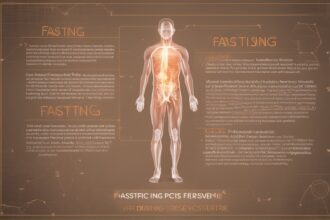Hey there, fasting enthusiasts! If you’ve ever wondered about the science behind skipping meals or embracing time-restricted eating, you’re in the right place. Today, we’re diving deep into fasting research—the studies, findings, and real-world implications that make fasting a hot topic in health and wellness. Whether you’re a seasoned faster or just curious about intermittent fasting benefits, this post will break down the latest discoveries and offer actionable tips to incorporate fasting into your life. Let’s explore how science is shedding light on this ancient practice and why it might just be the key to better health.
What Is Fasting Research and Why Does It Matter?
Fasting research refers to the scientific studies exploring how periods of voluntary food abstinence impact the body and mind. From intermittent fasting (IF) to prolonged fasting, researchers are uncovering how these practices influence everything from weight loss to brain health. The buzz around fasting isn’t just hype—studies dating back decades, with a surge in the last 10–15 years, show promising results. Why does this matter? Well, in a world of fad diets and quick fixes, fasting studies provide evidence-based insights into sustainable health practices. Understanding the science can help you make informed decisions about whether fasting is right for you.
Key Findings from Recent Fasting Studies
Let’s get into the juicy stuff— what does the latest fasting research actually say? Scientists have been busy, and the results are fascinating. Studies published in journals like Cell Metabolism and The New England Journal of Medicine highlight fasting’s role in metabolic health. For instance, intermittent fasting—cycles of eating and fasting, like the 16:8 method—has been shown to improve insulin sensitivity, a key factor in managing blood sugar. Other research points to fasting triggering autophagy, a cellular “cleanup” process that may slow aging. And let’s not forget weight loss; clinical trials consistently show that time-restricted eating helps reduce body fat without the misery of constant calorie counting.
- A 2020 study found that intermittent fasting reduced inflammation markers in adults with obesity.
- Research from 2019 showed fasting for 24 hours weekly improved gut microbiome diversity.
- Animal studies suggest fasting may protect against neurodegenerative diseases like Alzheimer’s.
- Human trials indicate fasting boosts ketone production, supporting brain health.
Fasting and Longevity: Can It Really Extend Life?
One of the most exciting areas of fasting science is its potential link to longevity. While human studies are still catching up, animal research is promising. For example, studies on mice and worms (yes, worms!) show that calorie restriction and fasting-like states extend lifespan by reducing oxidative stress and improving cellular repair. In humans, fasting research from the University of Southern California suggests that periodic fasting-mimicking diets can lower risk factors for age-related diseases like diabetes and heart disease. While we can’t promise you’ll live to 120, these findings hint that fasting could help you live healthier for longer.
Mental Health Benefits Backed by Fasting Research
Did you know fasting might do wonders for your mind as well as your body? Emerging intermittent fasting studies are exploring how fasting impacts mental clarity and mood. When you fast, your body shifts to burning ketones for fuel, which some researchers believe enhances brain function. A 2021 study in Frontiers in Psychiatry noted that participants on fasting protocols reported lower anxiety and improved focus. This could be a game-changer for anyone dealing with brain fog or stress. Plus, fasting’s effect on reducing inflammation may play a role in combating depression, though more research is needed.
Practical Tips to Start Fasting Based on Science
Okay, so the science of fasting sounds amazing, but how do you actually start? Don’t worry—I’ve got you covered with practical tips grounded in fasting research findings. The key is to ease into it and listen to your body. Fasting isn’t a one-size-fits-all approach, and studies show that gradual adaptation leads to better adherence. Whether you’re trying the 5:2 method (eating normally five days, restricting calories two days) or a daily 16:8 schedule, here are some ways to make fasting work for you without feeling like you’re starving.
- Start small: Begin with a 12-hour overnight fast and gradually extend the fasting window.
- Stay hydrated: Drink plenty of water, as dehydration can mimic hunger during fasting.
- Break your fast wisely: Opt for nutrient-dense foods like veggies and protein to avoid blood sugar spikes.
- Track your progress: Use a journal to note energy levels and mood, as research shows mindfulness improves outcomes.
- Consult a pro: If you have medical conditions, check with a doctor before diving into fasting protocols.
Potential Risks and What Fasting Research Warns About
Before you jump on the fasting bandwagon, let’s talk about the flip side. While fasting health studies are largely positive, they also highlight potential risks. For some, fasting can lead to irritability, fatigue, or even disordered eating patterns if not done mindfully. Research from 2022 warns that prolonged fasting without supervision may cause nutrient deficiencies or muscle loss. It’s also not suitable for everyone—pregnant individuals, those with eating disorders, or people with certain medical conditions should steer clear. The takeaway? Fasting can be powerful, but it’s crucial to approach it with balance and awareness of your unique needs.
As we wrap up this deep dive into fasting research, it’s clear that science is uncovering incredible benefits—from better metabolic health to potential longevity perks and mental clarity. But remember, fasting isn’t a magic bullet. It’s a tool, and like any tool, it works best when used wisely. Start small, stay informed with the latest fasting studies, and tailor your approach to fit your lifestyle. Have you tried fasting yet, or are you inspired to give it a shot? Drop your thoughts or questions below—I’d love to hear how this ancient practice is shaping your health journey. Let’s keep learning and growing together!






